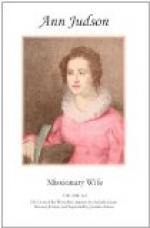Thus did this heroic woman, with that divine “instinct that seems to guide the noblest natures in great emergencies, decide to return alone to the mission-house, there to await the return of her husband, or the confirmation of her worst fears concerning his fate.” It was a wonderful exhibition of courage and constancy; “and gave assurance of all the distinguished qualities, which at a later period, and amid dangers still more appalling, shone with such brightness around the character of this remarkable woman. The event justified her determination; and within a week after her decision was taken, Mr. Judson arrived at Rangoon, having been driven from place to place by contrary winds, and having entirely failed of the object for which he undertook the voyage.
“Mr. and Mrs. Hough, after long delays, reached Bengal, carrying with them the press and all the implements of the printing-house. Their removal was subsequently productive of many embarrassments to the Mission, and seems never to have been fully justified either by Mr. Judson or the Board of Managers in America."[3]
FOOTNOTES:
[Footnote 3: Gammell.]
CHAPTER X.
INTOLERANCE OF THE BURMAN GOVERNMENT.—FIRST EDIFICE FOR CHRISTIAN WORSHIP ERECTED.—INSTRUCTION OF NATIVES.—CONVERSION OF A NATIVE.—HIS BAPTISM.—THAT OF TWO TIMID DISCIPLES.—MESSRS. JUDSON AND COLMAN VISIT AVA.
A few weeks after the return of Mr. Judson, the prospects of the Mission were still further brightened by the arrival of Messrs. Colman and Wheelock, who, with their wives, had been appointed by the Board in America, Missionaries to Burmah. They were young men of good talents, fervent piety, and extraordinary devotion to the object of evangelizing the heathen.
Mr. Judson, considering himself sufficiently master of the language to preach publicly, decided to build a small zayat, on a much frequented road, where he could preach the gospel, and converse with any native who might desire it, and where Mrs. Judson could meet female inquirers, and hold a school for religious and other instruction. He knew that this might draw upon them the displeasure of the higher powers, which had hitherto favored them because of the privacy of their life, and their small influence with the natives; for this government, as they afterwards discovered, though remarkably tolerant to foreigners, is highly intolerant to its own subjects in religious matters. Dr. Malcom remarks: “Foreigners of every description are allowed the fullest exercise of their religion. They may build places of worship in any place, and have their public festivals and processions without molestation. But no Burman may join any of these religions, under the severest penalties. In nothing does the government more thoroughly display its despotism, than in its measures for suppressing all religious innovation, and supporting the established system.... The whole population is thus held in chains, as iron-like as caste itself; and to become a Christian openly, is to hazard everything, even life itself.” But the Missionaries not being at this time at all aware of the rigor of this intolerance, resolved to make the attempt, and trust in the Lord for protection.




